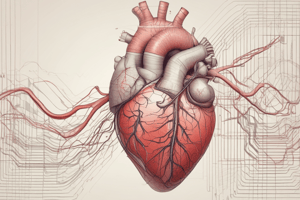Podcast
Questions and Answers
What is the percentage of Ejection Fraction in a normal condition?
What is the percentage of Ejection Fraction in a normal condition?
- 75%
- 70%
- 63% (correct)
- 60%
What is the mortality risk in the first year after diagnosis of Heart Failure?
What is the mortality risk in the first year after diagnosis of Heart Failure?
- 30%
- 20%
- 40% (correct)
- 50%
What is the average life expectancy after diagnosis of Heart Failure?
What is the average life expectancy after diagnosis of Heart Failure?
- 3 years (correct)
- 2 years
- 5 years
- 10 years
How many times more likely are people with T2D to develop chronic Heart Failure?
How many times more likely are people with T2D to develop chronic Heart Failure?
What percentage of people with T2D also have Heart Failure?
What percentage of people with T2D also have Heart Failure?
What is the primary function of the heart in the cardiovascular system?
What is the primary function of the heart in the cardiovascular system?
What is the term for the contraction of the heart, mainly the ventricles?
What is the term for the contraction of the heart, mainly the ventricles?
What is the average heart rate in a healthy individual?
What is the average heart rate in a healthy individual?
What is the formula for calculating cardiac output?
What is the formula for calculating cardiac output?
What is the term for the amount of blood pumped by the ventricles in one beat?
What is the term for the amount of blood pumped by the ventricles in one beat?
Flashcards are hidden until you start studying
Study Notes
Cardiovascular System
- Cardiovascular system, also known as circulatory system, consists of Heart, Blood vessels, and Blood.
- The heart's function is to pump blood throughout the body.
- The four chambers of the heart are:
- Right atrium
- Left atrium
- Right ventricle
- Left ventricle
Important Terms
- Systole: contraction of the heart, mainly the ventricles, during which blood is pumped to the arteries.
- Diastole: relaxation of the heart, mainly the ventricles, during which they are filled with blood.
- Heart rate (HR): the number of times the heart beats in a minute, normally around 72 beats per minute.
- Stroke Volume (SV): the amount of blood pumped by the ventricles in one beat, approximately 70 ml in a healthy individual.
- Cardiac output (CO): the amount of blood pumped by the heart in one minute, calculated by CO = Heart Rate x Stroke Volume.
- End Diastolic volume: the volume present in the ventricles at the end of diastole, approximately 110-120 ml.
- Ejection Fraction (EF): the fraction of the end diastolic volume ejected, calculated by EF = Stroke Volume / End Diastolic Volume, normally around 63%.
Heart Failure
- Heart failure (HF) is a chronic, progressive condition in which the heart muscle is unable to pump enough blood to meet the body's needs for blood and oxygen.
- Epidemiology:
- HF leads to recurrent hospitalization in the elderly.
- HF costs billions to healthcare and are increasing with ageing population and prevalence of major heart risk factors, lifestyle changes, and diabetes.
- The first year after diagnosis, mortality risk is highest, at 40%.
- The average life expectancy after diagnosis is 3 years.
- Diabetes is associated with a higher risk of HF:
- Approximately 3 out of 10 people with type 2 diabetes (T2D) also have HF.
- People with T2D are 2.5 times more likely to develop chronic HF than those without T2D.
- People with HF and T2D have reduced survival.
Studying That Suits You
Use AI to generate personalized quizzes and flashcards to suit your learning preferences.




